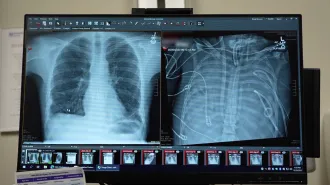Clear Skin: Injections counteract psoriasis in patients
Injections of an immune system protein can alleviate skin problems in people with psoriasis, a German-Dutch research team reports. The well-tolerated protein, called interleukin-4, works as well as a powerful standard therapy known to cause severe side effects. If the results are confirmed in larger studies, interleukin-4 could offer an alternative therapy for this difficult-to-treat disease.
Psoriasis is marked by an overproduction of skin cells. The scaly skin that results causes itching, burning, and pain. Scientists consider the disease an autoimmune disorder, in which the immune system attacks a person’s own tissues.
The researchers instructed 22 patients with moderate-to-severe psoriasis to inject themselves with interleukin-4 three times a day for 6 weeks. Eight other patients received photochemotherapy, the most potent therapy currently in use. In this treatment, patients expose their skin to ultraviolet light and take the immune-suppressing drug methotrexate. All the people in this study hadn’t responded adequately to other psoriasis therapies.
All the volunteers, whether they had received interleukin-4 or photochemotherapy, showed significantly improved psoriasis symptoms during 6 weeks of treatment and 6 weeks of follow-up, reports Martin Röcken, a dermatologist at the Eberhard Karls University in Tuebingen, Germany. For instance, on a standard scale of psoriasis-symptom severity, 19 of 22 patients taking interleukin-4 improved by at least 50 percent. None of the patients had side effects that were more than minor, says Röcken.
The eight patients getting photochemotherapy achieved similar responses during the study, Röcken and his colleagues report in the January Nature Medicine.
The ultraviolet-light therapy is inconvenient and boosts the risk of skin cancer, says dermatologist Gerald Krueger of the University of Utah in Salt Lake City.
Methotrexate carries a risk of liver damage. Other psoriasis medications can leave patients vulnerable to side effects that include infections, headaches, fever, and nausea.
“Without a doubt, a new approach is needed” for psoriasis care, Krueger says. Previous studies in people have shown that interleukin-4 causes few side effects.
Whether interleukin-4 will be a successful treatment will depend on further testing and whether patients would be willing to put up with repeated injections, he says.
In the body, immune cells called CD4 T helper cells produce a host of proteins, including interleukin-4, that orchestrate the response to invaders. In psoriasis, these cells overproduce a damaging protein called interferon-gamma. Röcken found that interleukin-4 treatment reduced the proportion of interferon-making cells in patients’ skin lesions and boosted the proportion of cells making interleukin-4. The healing scores for patients correlated closely with the extent of this change, Röcken says.
****************
If you have a comment on this article that you would like considered for publication in Science News, please send it to editors@sciencenews.org.







